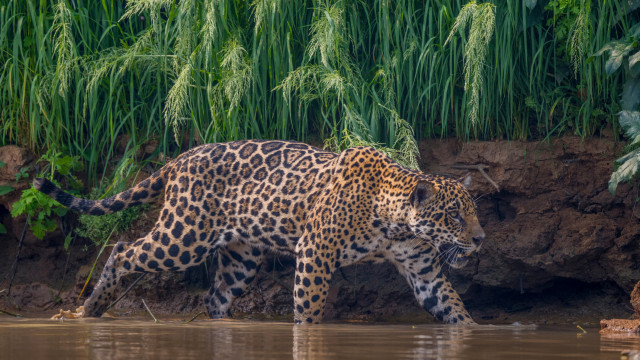





























© Shutterstock
0 / 30 Fotos
Opossum
- The Virginia Algonquian language has a similar word for the animal, opassum. Op means "white," and assum means "dog." In the early 17th century, this word was written down in English as opossum.
© Shutterstock
1 / 30 Fotos
Hurricane
- The Maya believed in a "god of the storm," whom they called Hunraken. Spanish explorers changed the spelling to huracán and used it to describe a weather phenomenon. By the 16th century, "hurricane" had been introduced into the English language.
© Shutterstock
2 / 30 Fotos
Poncho
- Indigenous peoples who speak Araucanian languages in central Chile dubbed their woolen shawl a pontho.
© Shutterstock
3 / 30 Fotos
Squash
- The Narragansett tribe from present-day New England called the fruit askútasquash, which was eventually shortened to squash in English. The word translates to "raw and uncooked."
© Shutterstock
4 / 30 Fotos
Chipmunk
- For the Ojibwe tribe, the word for this animal is jidmoonh. This was adapted to the English word chipmunk. However, when first seen in print in the 1820s, it was spelled "chitmunk."
© Shutterstock
5 / 30 Fotos
Chocolate
- The word "chocolate" comes from Nahuatl, a language spoken by the Aztecs. They would make a drink from ground cacao seeds called chikolotl.
© Shutterstock
6 / 30 Fotos
Moccasin
- This word can be traced back to many different Native languages. It could be because many tribes used a similar moccasin-style shoe, which was crafted out of tanned leather.
© Shutterstock
7 / 30 Fotos
Husky
- The Inuit people used husky dogs to pull sleds across the snow. The word huskemaw meant Eskimo dog.
© Shutterstock
8 / 30 Fotos
Hammock
- This word comes from hamaca, which is believed to come from the now-extinct Taíno language, or from a related Arawakan language. It originally referred to a "stretch of cloth."
© Shutterstock
9 / 30 Fotos
Barbecue
- Barbecue also comes from a Taíno word, barbacòa, and entered the English vocabulary via Spanish explorers, who must have liked the cooking method.
© Shutterstock
10 / 30 Fotos
Raccoon
- The Powhatan tribe used aroughcun to describe a creature that "scratches with its hands." This word has slowly changed over centuries to become raccoon.
© Shutterstock
11 / 30 Fotos
Igloo
- The term igloo now refers to snow huts built by Native Alaskan tribes. However, the original word igdlu belonged to a broader group of words. These included igluik, meaning town, and iglulirmiut, meaning people.
© Shutterstock
12 / 30 Fotos
Anorak
- The waterproof jacket known as an anorak comes from the Inupiat word annoraaq, which translates to "a beaded garment worn by women." It only appeared in the English language during the 1920s.
© Shutterstock
13 / 30 Fotos
Pecan
- Pecan comes from the Algonquian word pakani, which means "all nuts that require a stone to crack."
© Shutterstock
14 / 30 Fotos
Moose
- Coming from the Native Abenaki language, moz literally describes an animal that "strips bark from a tree."
© Shutterstock
15 / 30 Fotos
Shack
- The word shack stems from the word xahcalli, which means "grass hut" in the Nahuatl language.
© Shutterstock
16 / 30 Fotos
Caucus
- Most linguists believe caucus has its origins in the Algonquian word cawaassough, meaning to counsel and advise.
© Shutterstock
17 / 30 Fotos
Tobacco
- The Taíno language had a word that referred to a roll of tobacco leaves, tabako, which became tobacco in English.
© Shutterstock
18 / 30 Fotos
Avocado
- Avocado comes from the Nahuatl name for the fruit, ahuacatl, which was also slang for "testicle." It entered Spanish in the late 1600s as aguacate, and was eventually Anglicized as avocado.
© Shutterstock
19 / 30 Fotos
Guacamole
- Similarly, guacamole stems from two Nahuatl words: ahuacatl (avocado) and molli (sauce). Mix them together and you make ahuacamolli.
© Shutterstock
20 / 30 Fotos
Terrapin
- The word terrapin is derived from the Algonquian word torope, meaning "little turtle."
© Shutterstock
21 / 30 Fotos
Toboggan
- Derived from the Mikmaq word topoqan, meaning sled, the English version of the word was first used by colonists as they ventured across America.
© Shutterstock
22 / 30 Fotos
Savanna
- You might think of the African continent when it comes to the word "savanna." But its origins can be traced back to the Taíno word sabana.
© Shutterstock
23 / 30 Fotos
Skunk
- The skunk was revered by many tribes for its potential medicinal properties. The Cherokee believed that the odor of the sekakwa, which literally translates to urinating fox, could fight disease.
© Shutterstock
24 / 30 Fotos
Kayak
- Kayak can be traced back to the Inuit of present-day Greenland, who call the long boat qajaq.
© Shutterstock
25 / 30 Fotos
Canoe
- Canoe, on the other hand, was coined by a different tribe, and comes from the Arawakan word canaoua.
© Shutterstock
26 / 30 Fotos
Tomahawk
- You may associate tomahawk with a type of stake, but the word originated in the Algonquian language as otomahuk. Literally, this word meant "to knock something down." For some tribes, a tomahawk was a type of single-handed axe.
© Shutterstock
27 / 30 Fotos
Yankee
- The nickname used for an inhabitant of New England, or the northern states, "yankee" comes from the Cherokee word eankke, meaning slave or coward.
© Shutterstock
28 / 30 Fotos
Woodchuck
- Also known as a groundhog, the word "woodchuck" possibly derived from the Algonquian word wuchak, or the Cree word otcheck. Sources: (Mental Floss) (Time) See also: The biggest Native American tribes in the US today
© Shutterstock
29 / 30 Fotos
© Shutterstock
0 / 30 Fotos
Opossum
- The Virginia Algonquian language has a similar word for the animal, opassum. Op means "white," and assum means "dog." In the early 17th century, this word was written down in English as opossum.
© Shutterstock
1 / 30 Fotos
Hurricane
- The Maya believed in a "god of the storm," whom they called Hunraken. Spanish explorers changed the spelling to huracán and used it to describe a weather phenomenon. By the 16th century, "hurricane" had been introduced into the English language.
© Shutterstock
2 / 30 Fotos
Poncho
- Indigenous peoples who speak Araucanian languages in central Chile dubbed their woolen shawl a pontho.
© Shutterstock
3 / 30 Fotos
Squash
- The Narragansett tribe from present-day New England called the fruit askútasquash, which was eventually shortened to squash in English. The word translates to "raw and uncooked."
© Shutterstock
4 / 30 Fotos
Chipmunk
- For the Ojibwe tribe, the word for this animal is jidmoonh. This was adapted to the English word chipmunk. However, when first seen in print in the 1820s, it was spelled "chitmunk."
© Shutterstock
5 / 30 Fotos
Chocolate
- The word "chocolate" comes from Nahuatl, a language spoken by the Aztecs. They would make a drink from ground cacao seeds called chikolotl.
© Shutterstock
6 / 30 Fotos
Moccasin
- This word can be traced back to many different Native languages. It could be because many tribes used a similar moccasin-style shoe, which was crafted out of tanned leather.
© Shutterstock
7 / 30 Fotos
Husky
- The Inuit people used husky dogs to pull sleds across the snow. The word huskemaw meant Eskimo dog.
© Shutterstock
8 / 30 Fotos
Hammock
- This word comes from hamaca, which is believed to come from the now-extinct Taíno language, or from a related Arawakan language. It originally referred to a "stretch of cloth."
© Shutterstock
9 / 30 Fotos
Barbecue
- Barbecue also comes from a Taíno word, barbacòa, and entered the English vocabulary via Spanish explorers, who must have liked the cooking method.
© Shutterstock
10 / 30 Fotos
Raccoon
- The Powhatan tribe used aroughcun to describe a creature that "scratches with its hands." This word has slowly changed over centuries to become raccoon.
© Shutterstock
11 / 30 Fotos
Igloo
- The term igloo now refers to snow huts built by Native Alaskan tribes. However, the original word igdlu belonged to a broader group of words. These included igluik, meaning town, and iglulirmiut, meaning people.
© Shutterstock
12 / 30 Fotos
Anorak
- The waterproof jacket known as an anorak comes from the Inupiat word annoraaq, which translates to "a beaded garment worn by women." It only appeared in the English language during the 1920s.
© Shutterstock
13 / 30 Fotos
Pecan
- Pecan comes from the Algonquian word pakani, which means "all nuts that require a stone to crack."
© Shutterstock
14 / 30 Fotos
Moose
- Coming from the Native Abenaki language, moz literally describes an animal that "strips bark from a tree."
© Shutterstock
15 / 30 Fotos
Shack
- The word shack stems from the word xahcalli, which means "grass hut" in the Nahuatl language.
© Shutterstock
16 / 30 Fotos
Caucus
- Most linguists believe caucus has its origins in the Algonquian word cawaassough, meaning to counsel and advise.
© Shutterstock
17 / 30 Fotos
Tobacco
- The Taíno language had a word that referred to a roll of tobacco leaves, tabako, which became tobacco in English.
© Shutterstock
18 / 30 Fotos
Avocado
- Avocado comes from the Nahuatl name for the fruit, ahuacatl, which was also slang for "testicle." It entered Spanish in the late 1600s as aguacate, and was eventually Anglicized as avocado.
© Shutterstock
19 / 30 Fotos
Guacamole
- Similarly, guacamole stems from two Nahuatl words: ahuacatl (avocado) and molli (sauce). Mix them together and you make ahuacamolli.
© Shutterstock
20 / 30 Fotos
Terrapin
- The word terrapin is derived from the Algonquian word torope, meaning "little turtle."
© Shutterstock
21 / 30 Fotos
Toboggan
- Derived from the Mikmaq word topoqan, meaning sled, the English version of the word was first used by colonists as they ventured across America.
© Shutterstock
22 / 30 Fotos
Savanna
- You might think of the African continent when it comes to the word "savanna." But its origins can be traced back to the Taíno word sabana.
© Shutterstock
23 / 30 Fotos
Skunk
- The skunk was revered by many tribes for its potential medicinal properties. The Cherokee believed that the odor of the sekakwa, which literally translates to urinating fox, could fight disease.
© Shutterstock
24 / 30 Fotos
Kayak
- Kayak can be traced back to the Inuit of present-day Greenland, who call the long boat qajaq.
© Shutterstock
25 / 30 Fotos
Canoe
- Canoe, on the other hand, was coined by a different tribe, and comes from the Arawakan word canaoua.
© Shutterstock
26 / 30 Fotos
Tomahawk
- You may associate tomahawk with a type of stake, but the word originated in the Algonquian language as otomahuk. Literally, this word meant "to knock something down." For some tribes, a tomahawk was a type of single-handed axe.
© Shutterstock
27 / 30 Fotos
Yankee
- The nickname used for an inhabitant of New England, or the northern states, "yankee" comes from the Cherokee word eankke, meaning slave or coward.
© Shutterstock
28 / 30 Fotos
Woodchuck
- Also known as a groundhog, the word "woodchuck" possibly derived from the Algonquian word wuchak, or the Cree word otcheck. Sources: (Mental Floss) (Time) See also: The biggest Native American tribes in the US today
© Shutterstock
29 / 30 Fotos
English words that come from Native American languages
You've probably used many of these words
© Shutterstock
Most people are aware that many common geographical names found throughout the USA and Canada have been borrowed from various
Native American
languages. But these are not the only examples of linguistic borrowings taken from the indigenous vocabulary. From avocado and skunk to hammock, Native American languages have given English speakers a wonderful dictionary of words frequently used today.
Check out this gallery for some commonly used words in English, which were coined by indigenous peoples across the Americas.
RECOMMENDED FOR YOU




































MOST READ
- Last Hour
- Last Day
- Last Week








